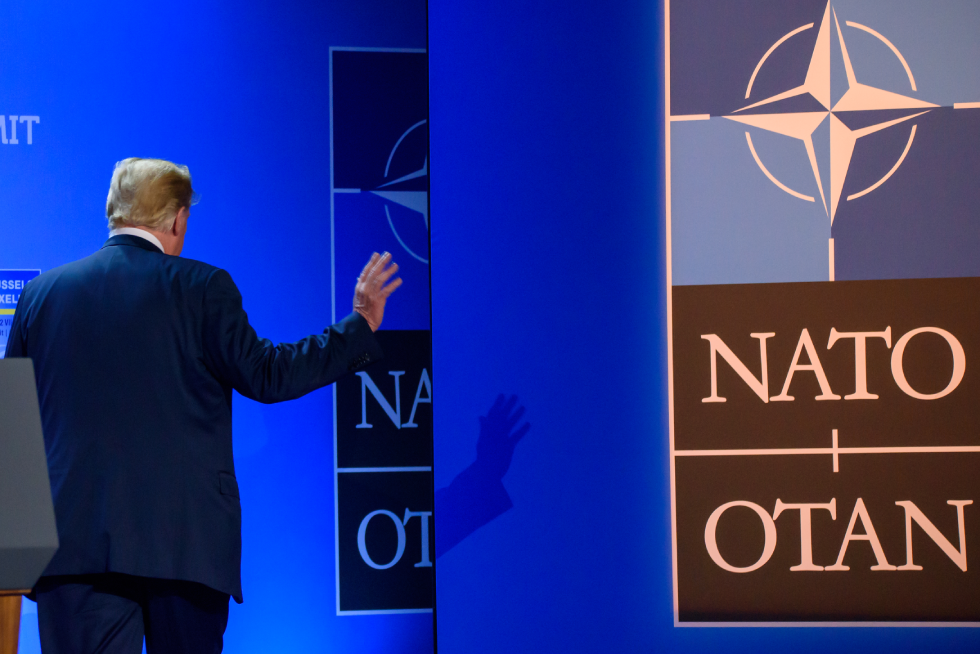In April 1949, as Cold War tensions between the United States and Soviet Union intensified, 12 nations came together to sign the North Atlantic Treaty, giving birth to NATO. The alliance was formed with a clear purpose: to provide collective defense against the looming threat of Soviet expansion. At that time, Europe was still reeling from the devastation of World War II, its economies in shambles and its militaries depleted. The US, triumphant in victory and solidifying its position as a global superpower, took on the mantle of protector, extending its military might across the Atlantic and halfway across Europe.
Fast forward 75 years. The world has changed dramatically, yet NATO persists as a relic of a bygone era. The Soviet Union is no more, replaced by a Russia with a GDP smaller than Italy’s. The European Union, along with the United Kingdom, boasts a combined economy nearly ten times the size of Russia’s. France and the UK possess their own nuclear deterrents. Yet, inexplicably, US taxpayers continue to foot the bill for Europe’s defense.
With Russia weakened, Europe is getting a free ride
Some argue that Russia’s actions in recent years, particularly its invasion of Ukraine, justify the US’s continued NATO membership. They paint a picture of a resurgent Russian threat, echoing the Cold War narratives of the past. But this comparison falls flat when we examine the facts.
During the Cold War, the US faced off against an empire of comparable might. The Soviet Union’s military and economic power posed a genuine threat to both Western Europe and US interests. Today’s Russia, however, is a shadow of its former self. With a GDP of about $2 trillion, it pales in comparison to the combined economic might of the EU and the UK, which totals more than $22 trillion.
Moreover, the population demographics tell a similar story. Russia’s population is less than 150 million, dwarfed by that of the EU and UK totaling more than 500 million. The combined military spending of the EU and UK stands at $370 billion, far outstripping Russia’s total defense budget of $130 billion. Yet, despite these advantages, Europe continues to rely on the United States for its security.
Ironically, the US’s persistent role in NATO may be making Europe less secure, not more. What matters for European defense isn’t raw might, but speed, agility and political will. NATO’s cumbersome decision-making process, requiring consensus among 32 members, is ill-suited to respond to modern threats. An army of motivated Polish and German fighters willing to fight and die to protect their freedom is a far greater deterrent to Russia than a US military that is truly awesome in its capabilities, but reliant on the whims of a foot-dragging US Congress for that to translate to the battlefield. The current arrangement doesn’t strengthen Europe; it weakens it, leaving the continent less prepared to address threats from Russia and elsewhere.
While US citizens shoulder the burden of NATO’s defense spending, Europeans have grown complacent. They’ve built generous welfare states where they enjoy long vacations, early retirements and universal healthcare. Meanwhile, US workers struggle with rising healthcare costs, minimal paid leave and relentless anxiety about how they will pay the bills.
This disparity is not just a matter of different priorities; it’s a direct result of Europe’s ability to skimp on defense spending, knowing full well that Uncle Sam will always be there to pick up the slack. It’s time to ask: Why should the US taxpayer subsidize Europe’s lavish lifestyle?
A new era demands new priorities
Proponents of NATO often point to the US’s nuclear umbrella as a critical component of European security. But this argument ignores a crucial fact: Both the UK and France possess their own nuclear arsenals, which was not the case when NATO was formed. These two European powers have more than enough nuclear capability to deter any potential aggressor. The idea that US nuclear weapons are necessary for European security is a Cold War anachronism that does not stand up to scrutiny.
As we approach 2025, the world faces challenges that were unimaginable when NATO was founded. Climate change, cyber and biological warfare and the rotting minds of our children addicted to social media platforms like TikTok and video games like Fortnite are the true existential threats of our time. These are the battles that will define the 21st century and beyond, not a rehash of 20th century geopolitics. If there is a new Cold War between rival superpowers, it exists across the North Pacific, not the North Atlantic.
It’s better for the US to leave
Some will argue that leaving NATO is too risky, that it could destabilize Europe and embolden Russia. But this view underestimates Europe’s capabilities and overestimates Russia’s. By continuing its outdated commitment to NATO, the US is fostering dependency and resentment, preventing Europe from developing the military self-reliance it needs.
Proponents of NATO often point to its invocation of Article 5 after the September 11 attacks as proof of the alliance’s value. However, this argument ignores a crucial reality: The response to the attacks would have happened with or without NATO. When faced with acts of aggression that demand a response, the United States has repeatedly demonstrated its ability to rapidly form and provide leadership to coalitions outside of formal alliance structures.
The First Gulf War in 1991 serves as a prime example. In response to Iraq’s invasion of Kuwait, the US quickly assembled a coalition of 42 nations, many of whom were not NATO members. This “coalition of the willing” included fighters from countries as diverse as Japan, New Zealand and Afghanistan. The swift and effective formation of this coalition underscores a fundamental truth: When genuine threats arise, nations band together to address them, which can be easier without the cumbersome framework of an organization like NATO.
Game theory offers another compelling reason for the US to leave: the strategic value of unpredictability. In a world of mass surveillance where concealing actions is increasingly difficult, being predictable can be a significant disadvantage. Consider a poker game where one player always has a pair of kings, while the other has queens or aces with equal probability. Despite each player having the stronger hand half the time, the unpredictable player will on average win more.
This principle applies similarly to military strategy. NATO’s rigid structure and well-defined protocols make its responses predictable. By leaving NATO, the US introduces an element of uncertainty that can serve as a more effective deterrent. Potential adversaries would no longer be able to rely on a known command and control structure or anticipate specific responses. This unpredictability can in turn force adversaries to be more cautious, preventing conflicts before they begin.
Moreover, while it is true that P implies Q does not mean the same as not P implies not Q, there is often an implicit assumption that it does. By the United States declaring “If there is an attack on a NATO country, there will be an overwhelming response from the United States” it suggests to potential enemies that “If there is an attack on a non-NATO country, the United States will not respond with overwhelming force.” This is clearly seen in Ukraine, where Putin is in plain sight employing the principle: “Ukraine not NATO, therefore Ukraine fair game.”
The reality on the ground is that the Iron curtain no longer exists and we live in a world with fuzzy borders and hybrid warfare. The correct response to this is illustrated regarding Taiwan. Will America go to war to defend Taiwan? It might. That should be the answer to every question of that form. Will America go to war over a sabotaged undersea cable or gas pipeline? It might. Will it go to war over an act of terrorism? It might. Will America go to war to defend Europe? It might. America should go to war when the American President and Congress decide that it should, not because of a treaty from three quarters of a century ago born of a different age. By withdrawing from NATO, the United States would put Ukraine on equal footing with not just Poland but also France and Germany, and be a masterstroke of expanding not contracting American influence.
In essence, by stepping away from NATO, the US would paradoxically enhance global security by keeping potential aggressors guessing about the nature and extent of possible responses to their actions.
It’s time to go
The time has come for bold leadership. President-elect Donald Trump’s landslide victory and Republican control of Congress provide a unique opportunity to reshape the US’s foreign policy. The nation must seize this moment to chart a new course. Leaving NATO will not only serve the interests of the US taxpayer, it will also help Europe by teaching it the pride of taking care of its own needs with its own hard work.
The US’s departure from NATO won’t be easy. It will require careful diplomacy, detailed planning and time. But it is a necessary step for both the US and Europe to address the real challenges of the 21st century.
And to those reading this in a nice coffee shop in a town square in Europe, I say this: If you want to continue enjoying your wine and your swimming pools, and your relaxed way of life, it’s time for you to fight for it — and pay for it — yourself.
[Lee Thompson-Kolar edited this piece.]
The views expressed in this article are the author’s own and do not necessarily reflect Fair Observer’s editorial policy.
Support Fair Observer
We rely on your support for our independence, diversity and quality.
For more than 10 years, Fair Observer has been free, fair and independent. No billionaire owns us, no advertisers control us. We are a reader-supported nonprofit. Unlike many other publications, we keep our content free for readers regardless of where they live or whether they can afford to pay. We have no paywalls and no ads.
In the post-truth era of fake news, echo chambers and filter bubbles, we publish a plurality of perspectives from around the world. Anyone can publish with us, but everyone goes through a rigorous editorial process. So, you get fact-checked, well-reasoned content instead of noise.
We publish 2,500+ voices from 90+ countries. We also conduct education and training programs
on subjects ranging from digital media and journalism to writing and critical thinking. This
doesn’t come cheap. Servers, editors, trainers and web developers cost
money.
Please consider supporting us on a regular basis as a recurring donor or a
sustaining member.
Will you support FO’s journalism?
We rely on your support for our independence, diversity and quality.









Comment
A good article! I firmly agree that it is unfair for the US taxpayer to keep footing the bill for European security. Every European country should meet the 2% GDP defence spending target, on principle if for no other reason. That said, I don’t agree that the US should leave NATO. On the contrary, NATO should expand to include Japan, S.Korea, Australia and New Zealand to ensure global security. As for us easy-living, spoilt Europeans, well, only Americans can change their work culture.